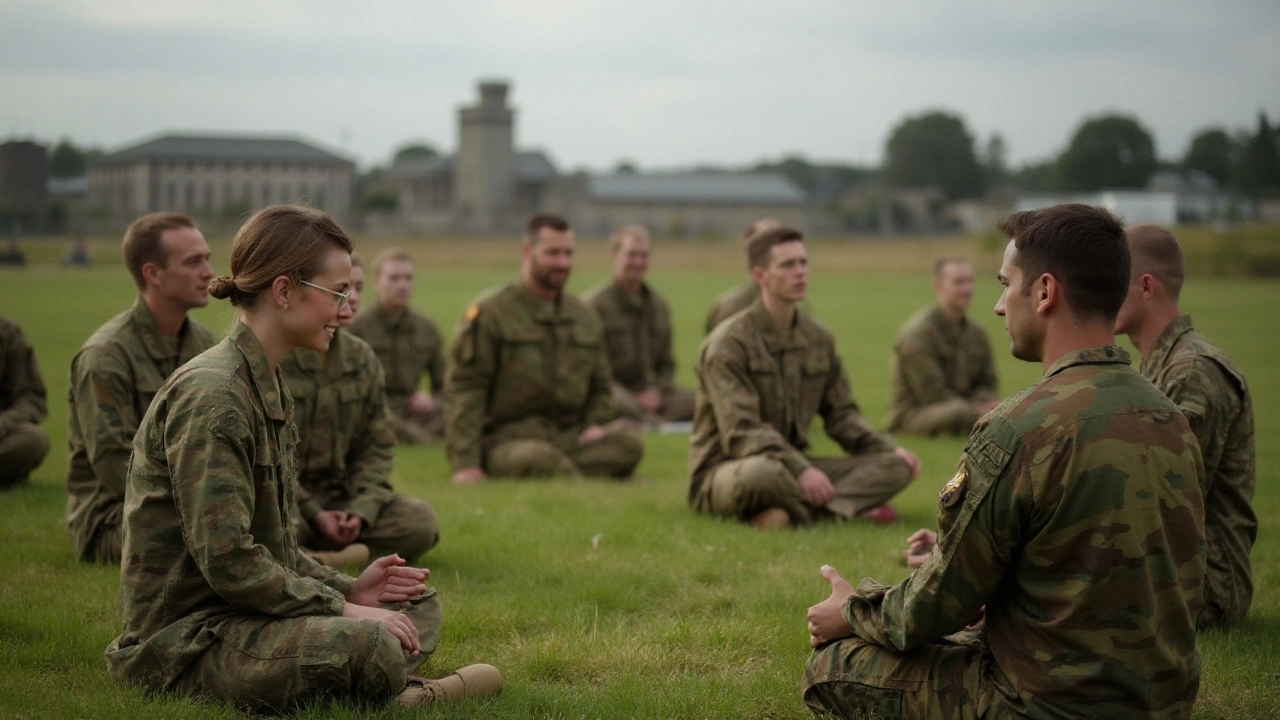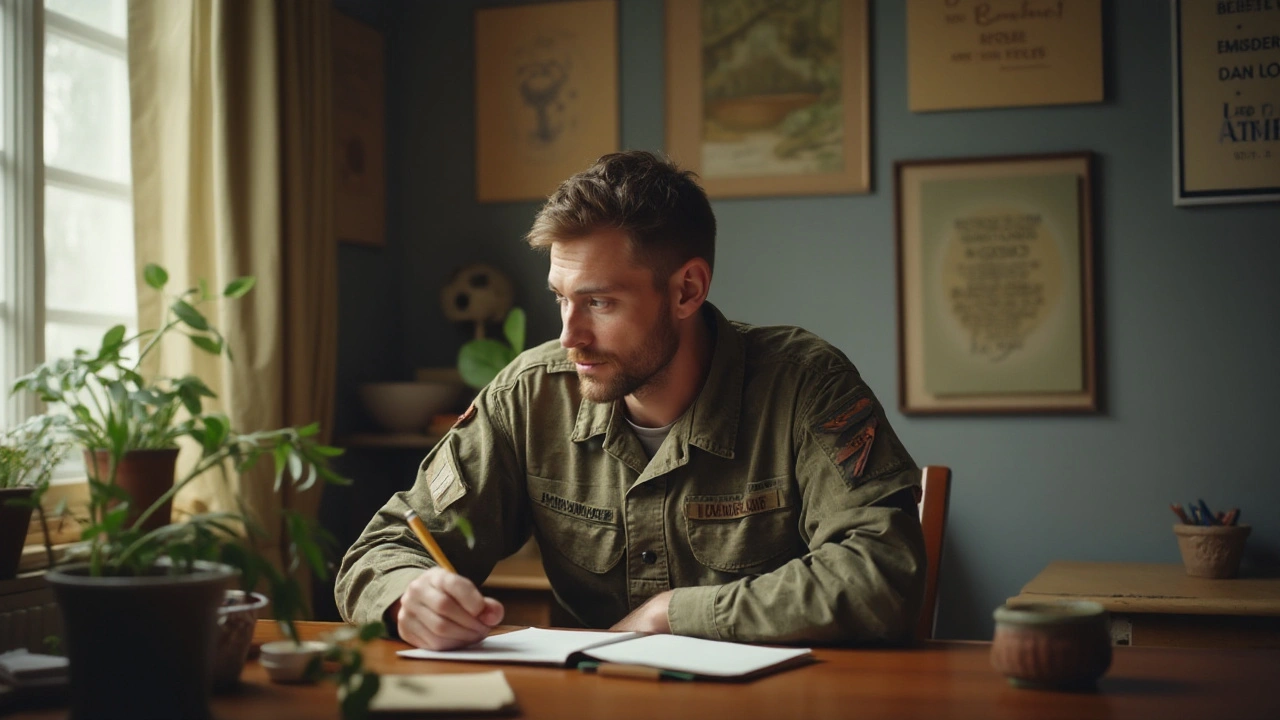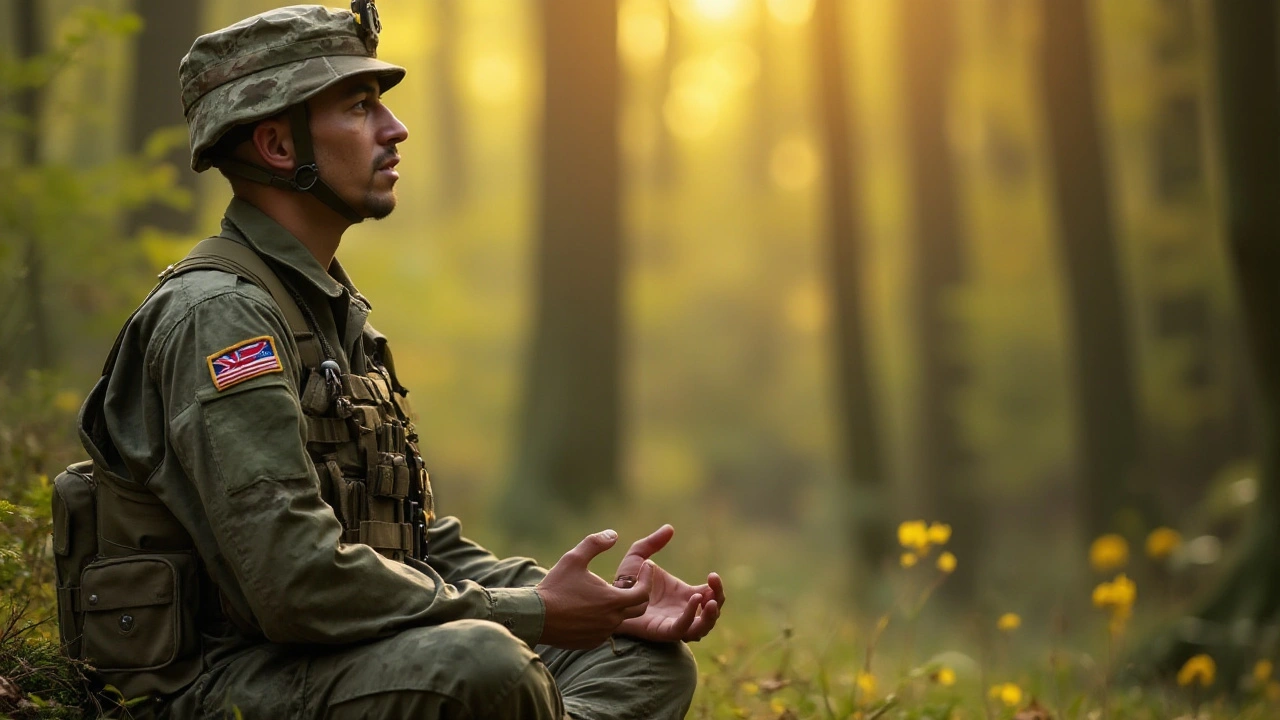In the high-stakes world of the military, maintaining mental well-being is as crucial as physical fitness. Mindfulness, a simple yet effective practice, is gaining traction as a tool to enhance resilience among soldiers.
Mindfulness involves focusing on the present moment without judgment. It sounds simple, but its impact can be profound. For military personnel, who often face extreme stress and high-pressure environments, mindfulness offers a way to stay grounded.
This article delves into the significance of mindfulness for soldiers, practical mindfulness techniques, its impact on mental health and resilience, and how it can be seamlessly incorporated into military training.
- The Importance of Mindfulness for Soldiers
- Practical Mindfulness Techniques
- Impact on Mental Health and Resilience
- Incorporating Mindfulness into Military Training
The Importance of Mindfulness for Soldiers
The role of a soldier is fraught with high-stress situations, potential danger, and the constant need to make quick, often critical decisions. This intense environment can take a toll on both mental and physical health. This is where mindfulness comes in. Soldiers who practice mindfulness typically experience lower levels of stress and greater resilience. It gives them a way to navigate through challenging scenarios with a clearer mind.
Historically, the military has adapted various strategies to combat stress. But the structured approach of mindfulness offers a more sustainable way to manage mental health. Mindfulness encourages soldiers to stay present, which can be particularly beneficial during combat. By focusing on the moment, they can manage anxiety and make decisions more effectively.
Studies have shown that mindfulness can reduce symptoms of PTSD. For soldiers, post-traumatic stress disorder is a common affliction, and traditional treatments often fall short. According to a study by the National Center for Complementary and Integrative Health, veterans who engaged in mindfulness meditation showed a significant reduction in PTSD symptoms compared to those who used standard treatments.
“Mindfulness practice helps soldiers by enhancing their emotional regulation. This crucial skill enables them to stay calm under pressure and make sound decisions,” says Dr. Elizabeth Stanley, a former Army officer and mindfulness expert.
Additionally, mindfulness enhances mental health beyond just stress reduction. It improves sleep, reduces inflammation, and builds a stronger immune system. Each of these benefits contributes to the overall well-being of military personnel. This holistic improvement makes mindfulness an indispensable tool for soldiers.
When soldiers practice mindfulness regularly, they become more aware of their thoughts and emotions. This increased awareness helps them identify negative patterns, allowing them to take proactive steps toward better mental health. Mindfulness also fosters a sense of community among soldiers. Group mindfulness sessions can build camaraderie and support systems within units, which is essential for morale.
Mindfulness is not a new concept in the military. Ancient warriors from different cultures, including the Samurai and Spartans, have used meditation and mindfulness techniques to prepare for battles. Today’s soldiers are revisiting these practices with modern nuances, reaping their timeless benefits.
One of the key aspects of mindfulness in the military is its adaptability. Soldiers can practice mindfulness anywhere—from a quiet moment in the barracks to a brief mental check-in before a mission. The flexibility of these practices makes them highly suitable for the unpredictable nature of military life.
To sum it up, the importance of mindfulness for soldiers lies in its ability to enhance resilience, improve mental health, and foster a strong support system within military units. These factors collectively contribute to more effective, healthier, and mentally stronger soldiers, who can carry out their duties with greater efficiency and peace of mind.

Practical Mindfulness Techniques
For military personnel, implementing mindfulness into their daily regimen can offer numerous benefits. These techniques are designed to be simple yet effective, providing a means to manage stress and enhance resilience. One of the most straightforward practices is mindful breathing, which can be done anywhere, at any time. Focusing on the breath helps anchor the mind, providing a break from the constant stimuli and stressors common in military life. Soldiers can start by setting aside five minutes a day to sit quietly and breathe deeply, paying attention to the sensation of the breath moving in and out of their bodies.
Another useful technique is body scan meditation. This practice involves directing attention to different parts of the body, noticing any sensations without judgment. It’s a way to foster a deeper connection with the body, which is particularly beneficial for those in physically demanding roles. A body scan can be done lying down or sitting comfortably, starting from the toes and moving upward, or vice versa. By regularly practicing body scans, soldiers can become more attuned to their physical state, which is crucial for identifying and managing tension and stress.
Guided visualization is also a valuable mindfulness tool. This involves imagining a peaceful scene or scenario, which can help distract from negative thoughts and create a sense of calm. For military personnel, visualizing a safe space can be particularly powerful. A structured visualization practice can last anywhere from a few minutes to half an hour, depending on individual needs and available time. Including vivid details in these visualizations can enhance their effectiveness, making the experience more immersive and soothing.
“Utilizing mindfulness techniques to support the mental health of our troops is a step toward promoting long-term resilience and operational effectiveness,” explains Dr. Sarah Lathan, a well-regarded psychologist specializing in military mental health.
Mindful movement, such as yoga or tai chi, can be particularly appealing for those who prefer a more active form of mindfulness. These practices combine physical movement with mindful awareness, promoting both mental and physical well-being. They can be easily incorporated into existing physical training routines, serving as a warm-up or cool-down that enhances flexibility and focus. Mindful walking, paying attention to each step and the sensation of feet touching the ground, is another accessible option, especially during patrols or between duties.
Journaling is another practical mindfulness technique. By setting aside time each day to write down thoughts and feelings, soldiers can gain insight into their mental state and track their emotional well-being over time. This practice can be particularly helpful for processing experiences and maintaining a sense of perspective. It’s recommended to write in the mornings or evenings when the mind is most reflective. Prompting questions – such as “What thoughts are taking up my mental space?” or “What am I feeling grateful for today?” – can guide the journaling process.
Maintaining a regular mindfulness practice requires consistency and intention. It can be helpful to establish a routine, integrating mindfulness techniques into daily activities. For instance, practicing mindful eating involves paying close attention to the taste, texture, and sensation of food, which can turn a regular meal into a focused, calming experience. This practice encourages savoring each bite, which can enhance digestion and promote a sense of contentment.
Offering workshops or training sessions on mindfulness can also greatly benefit military units. Trained professionals can provide tailored guidance and support, helping soldiers integrate these practices into their daily lives. Interactive sessions, group meditations, and follow-up support can reinforce the benefits of mindfulness, creating a more resilient and mentally healthy force.

Impact on Mental Health and Resilience
The military environment is known for its intense stress, high levels of uncertainty, and the ever-present demand for peak performance. These conditions make mental health a critical concern. Practicing mindfulness can significantly impact both mental health and resilience, providing soldiers with essential tools to manage stress.
One specific, accurate known fact is that mindfulness can reduce symptoms of PTSD. A study published in the Journal of Traumatic Stress found that mindfulness-based stress reduction (MBSR) significantly reduced PTSD symptoms in veterans. This evidence underscores the value of mindfulness not just as a wellness trend but as a therapeutic tool with measurable benefits.
Mindfulness also helps improve emotional regulation. For soldiers in challenging situations, maintaining emotional control can be the difference between life and death. By focusing on the present moment and acknowledging feelings without judgment, individuals can prevent negative emotions from escalating, thus making more rational decisions. This concept is vital for military personnel who must remain calm and collected under pressure.
The practice aids in building cognitive resilience. According to the American Psychological Association, mindfulness helps improve attention, increase self-awareness, and enhance emotional health. These improvements make soldiers more resilient by boosting their ability to recover from traumatic experiences and maintain high performance levels.
"The way we pay attention controls the way we live and navigate life, and mindfulness leverages that fact," says Dr. Amishi Jha, a neuroscientist who studies mindfulness and performance.
Another benefit is the reduction of anxiety. Military personnel often experience heightened states of anxiety due to the nature of their job. Mindfulness practices such as deep breathing exercises and body scans can lower cortisol levels, the stress hormone. Lower cortisol levels translate to reduced anxiety, better sleep, and an overall improved mood.
Studies also suggest that mindfulness can improve interpersonal relationships. In a military setting where teamwork is crucial, this can enhance unit cohesion and effectiveness. As soldiers become more aware of their actions and feelings, they communicate more clearly and empathetically, fostering a more supportive environment.
The benefits of mindfulness extend to improving physical health. Stress has numerous adverse effects on the body, such as high blood pressure and weakened immune function. By practicing mindfulness, soldiers can mitigate these stress-induced health issues, leading to better physical well-being, which directly contributes to mental resilience.
Mental health professionals often recommend mindfulness as part of a comprehensive resilience training program in the military. With ample evidence supporting its effectiveness, it's clear that mindfulness is not a fad but a vital tool for enhancing mental health and resilience in one of the world's most demanding professions.

Incorporating Mindfulness into Military Training
Training soldiers involves more than just physical prowess and tactical skills. Mental resilience is equally important, and this is where mindfulness comes in. By integrating mindfulness into military training programs, soldiers can build the mental fortitude needed to face challenging situations.
One practical approach to integrating mindfulness is through structured sessions that fit seamlessly into daily training routines. For example, short mindfulness exercises can be included during morning drills. These exercises can range from focused breathing techniques to brief meditation sessions that help soldiers center their thoughts and emotions.
Military academies and training centers are increasingly recognizing the benefits of mindfulness. Some have started incorporating mindfulness training into their curriculum. A study conducted by the U.S. Army found that soldiers who practiced mindfulness showed improved emotional regulation and a decrease in levels of anxiety and stress. This proactive approach to mental health can significantly enhance overall mission readiness.
Another method is to train leaders and officers in mindfulness techniques so they can coach their teams effectively. Leadership plays a crucial role in normalizing and promoting mental health practices. When officers model these behaviors, it removes any stigma surrounding mental wellness activities.
Workshops and dedicated training modules can also be extremely beneficial. These sessions can provide in-depth education on the science behind mindfulness, its benefits, and practical application. Soldiers can then practice these techniques in a controlled environment before using them in high-stress situations.
Beyond structured training, creating a culture that values mental well-being is essential. Encouraging open conversations about mental health and mindfulness helps in breaking down barriers. This cultural shift can lead to more acceptance and regular practice among soldiers.
Installing mindfulness apps on devices used by military personnel can make it easier to practice mindfulness on the go. Many of these apps offer guided meditations, breathing exercises, and other mindfulness tools that can be accessed anytime, anywhere. This flexibility ensures that mindfulness can be practiced even in the most hectic environments.
"Mindfulness should be viewed as a tool for readiness and resilience. It’s not just about stress relief; it's about creating an optimal state of mind for high performance," says Dr. Amishi Jha, a neuroscientist known for her work with the military.
Through consistent practice, mindfulness can become a natural part of a soldier’s routine, much like physical exercise. With these strategies, incorporating mindfulness into military training can lead to a more resilient and mentally robust force, prepared to face the complexities of modern warfare.

